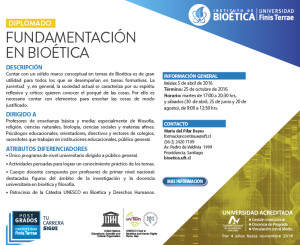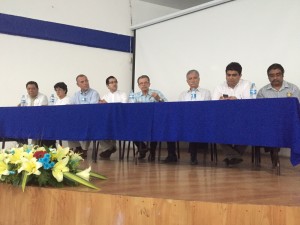Jan 20, 2016 | News
The UNESCO Chair in Bioethics and Human Rights recently formalized its sponsorship of the diploma program of the Institute of Bioethics in the Universidad Finis Terrae in Santiago, Chile.
The diploma program seeks to form in professional educators the competencies necessary to understand the nature of bioethics as an interdisciplinary discipline that analyses scientific and philosophical issues. The program also seeks to integrate these diverse fields of knowledge to transmit a unified vision to different social contexts and educational levels.
For more information on the program, visit the official site here.

Nov 7, 2015 | News
UNESCO Chair Director Alberto Garcia signed an accord on November 6, 2015 with the faculty of medicine of Universidad Autónoma de Guerrero in Acapulco, México to collaborate in offering young minds a solid bioethical formation.
During his visit to Acapulco, Garcia also spoke on Dr. Agustín Herrera’s new book El derecho a la salud (The Right to Health). Garcia had previously written the prologue to the same work.

Oct 15, 2015 | News
by Michael Baggot
In a recent Huffington Post blog entry, the Wexner Scholar at Rabbi Isaac Elchanan Theological Seminary Mark Weingarten recounts his experience at the summer course on Human Ecology co-sponsored by the Chair. Despite his cultural, religious, and age differences from many of the course’s participants, the young rabbinical student quickly found it easy to dialogue with his companions on the importance of promoting the vision of human ecology articulated in the Pope’s most recent encyclical Laudato Si’. For instance, he found in an England priest devoted to child protection and foster care a distinctly dressed companion in the common quest to create a more humane society open to the positive influence of faith in a world often characterized by individualism and skepticism.
Regina Apostolorum’s shared commitment to intellectual charity finds a uniquely multicultural and inter-religious dimension in the UNESCO Chair, which has facilitated since its 2009 foundation enriching encounters akin to Weingarten’s brief summer experience. Jointed hosted by the Bioethics faculty of Reginia Apostolorum and the Law faculty of the European University of Rome, the Chair dedicates intellectual resources to creating constructive dialogue on society’s most pressing issues among peoples of all backgrounds in order to contribute to a civilization of justice and love. The Chair seeks to create a forum of diverse bioethics thought leaders. Collaborating in a spirit of respect and friendship, it hopes to deliver a common framework to guide the application of bioethical principles in the light of the UNESCO Declaration. In this manner, it can inform and enlighten ethical, legal and public opinions, decisions and actions relative to medicine, life sciences, and human rights and responsibilities.
The intellectual charity at the root of the institute’s spirit of respect and friendship in collaborative work has found concrete expression in a series of international workshops on Bioethics, Multiculturalism, and Religion. In Jerusalem, Rome, Hong Kong, and Mexico scholars from seven faith traditions have gathered to analyze key bioethical themes. The intellectual charity driving these events has overcome all conflict between the apparently warring values of rigorous academic research and warm familial relations. Since the days include not only the presentation of prepared papers, but also ample time allotted to the open discussion of these works, there is a lively interchange that could easily degenerate into combative chaos without the exercise of virtue. Thanks to the intellectual charity that reigns, participants have spent the past years growing in mutual understanding and appreciation for their respective faith traditions, while also enjoying the confidence to challenge their companions to an ever more profound comprehension of the truth toward which all participants strive as companions. The sometimes fiery debates that ensue after certain presentations enable the speakers to revise their work before the final papers are published together by the prestigious company Springer. Again, when participants identify disagreements inevitable among such a culturally and religiously diverse body, they always do so with the utmost respect toward their fellow scholar and friend.
Further evidence of the force of this intellectual charity is in the informal exchanges that continue during the year. It is not uncommon for a professor of Buddhism in Hong Kong to email a Catholic priest question regarding the Magisterium’s view on a recent medical development. Nor is it uncommon for a Catholic lawyer from Spain to contact an expert in Hinduism in Houston regarding collaboration on an article. Intellectual charity sustains these relationships across the globe and strengthens the humility that enables individuals of differing worldviews to learn from each other and grow in the common quest for truth. Thus, the Chair’s international mission of “fostering the art of convergence and cooperation in global ethics” remains one of the university’s manifold manners of living its commitment to intellectual charity.
Jul 1, 2015 | News
The latest edition of the journal Studia Bioethica offers an in-depth analysis of the concept of human ecology that has garnered international attention since the publication of Pope Francis’s encyclical letter on Laudato Si’: On Care for our Common Home. The issue’s articles can be read online here.



